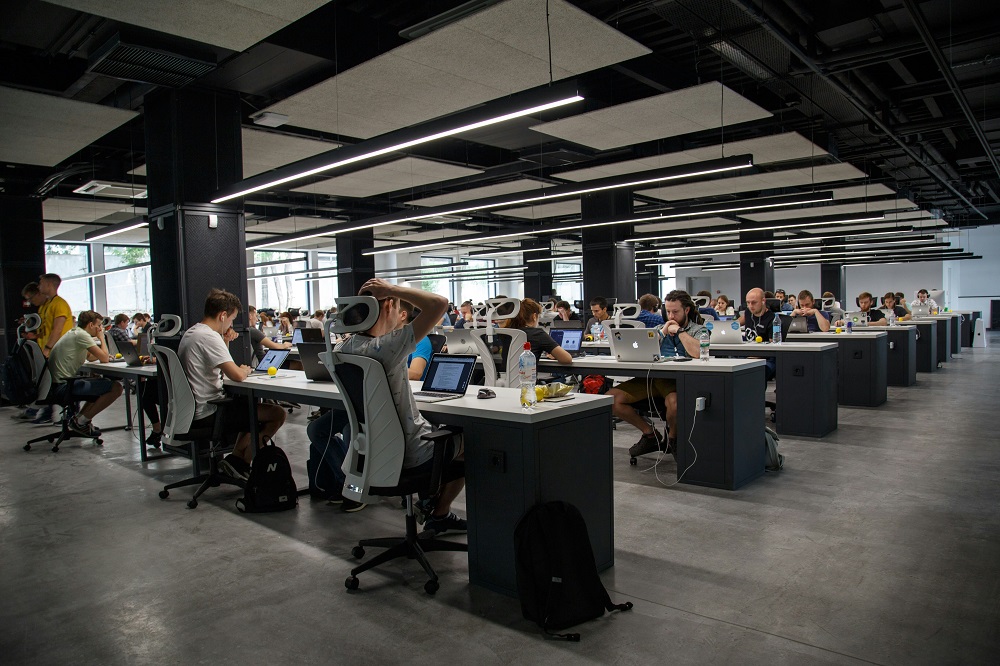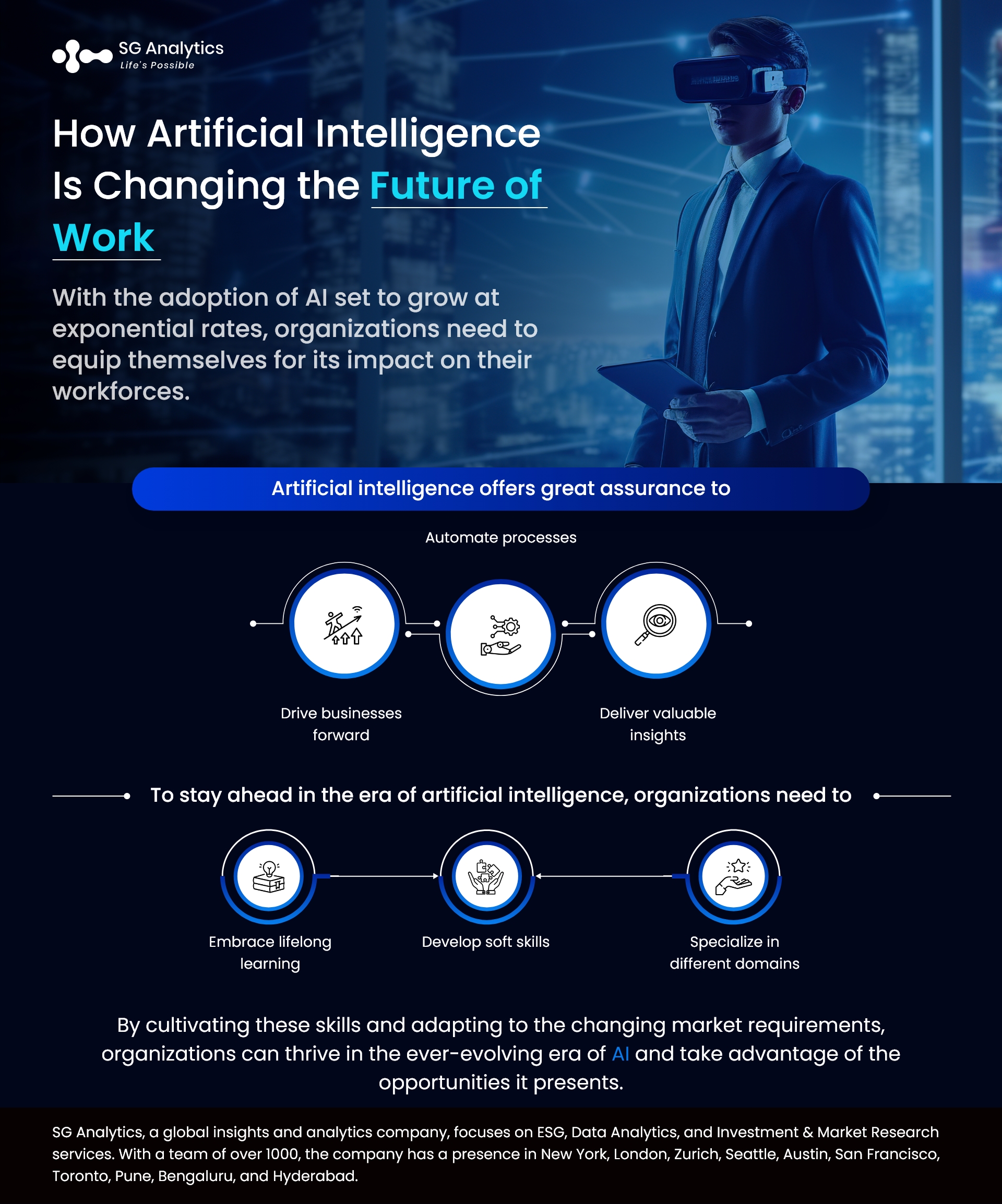Artificial intelligence is already at work in our everyday lives, influencing everything - from search results to online shopping.
But how will AI impact the future of work?
Democratization of AI
AI is becoming a reality with low-code and no-code programming tools. These tools enable organizations to shift from intuition-based decision-making mechanisms to making decisions supported by facts and intelligent predictions. AI and ML platforms are further offering new avenues to foster scalability and democratization, accelerating their transformation journey.
While AI is bringing in fundamental changes in ways of operations, these changes are likely to extend to an organization’s workforce as AI is set to become more embedded in the day-to-day business. With the further adoption of AI set to grow at exponential rates, organizations need to equip themselves for its impact on their workforces.
Read more: Ultimate Guide to Power Your Organization's Sustainable Digital Transformation
The sustainable business models lie in generative AI's infrastructure and research layer.
Generative AI is ushering in massive productivity gains and improved cost structures for businesses. Employees will be able to dramatically become more effective and productive, along with achieving new levels of creativity and innovation.
But given the extraordinarily high costs involved in training and running today’s AI model, how will enterprises attain these benefits in a cost-effective manner?
By shifting AI from hype to reality, organizations can unlock new, sustainable business insights that will positively transform the world of work for both employers and employees alike.

How Artificial Intelligence Will Change the World?
Artificial Intelligence is equipping organizations with new tools to achieve significant growth. Market research teams are integrating AI tools to bring about numerous positive changes in their marketing strategies, enhance productivity, and increase access to critical insights. AI technologies are creating new vocations and helping teams solve complex problems, thus making their daily operations easier and more convenient.
Preparing the workforce will help organizations adapt to the changes AI will bring. Organizations must also prepare themselves for the impact of AI on their operations and workforce. They must also prepare their people for this significant transition that AI is set to offer.
Read more: How Technology Will Change The Future of Work
Organizations should not hold back in impending these changes but rather equip their workforce to navigate through them. With AI set to reshape industries, many emerging job roles will demand specialized technical skills. Organizational leaders must face the reality that certain job profiles will likely become redundant. It is, therefore, vital to develop strategies to empower individuals with the aptitude for AI.
A concerted effort to navigate through this transition will involve providing training to help employees grasp AI's potential and fuel innovation and growth. Empowering employees to experiment with AI is vital, as it will assist them to use AI responsibly.
Establishing robust guidelines for AI governance is equally imperative. AI algorithms are only as good as the data they are given. Therefore, organizations need to constantly monitor the quality of data being fed to the systems to train AI models to avoid bias. AI-driven decisions need to be transparent so that employees can fully understand how they were reached.

Finally, while organizations continue to explore the use of AI more effectively, they also need to keep in mind its evolutionary nature and impact. While AI is now commonly used across different areas of the business, organizations need to foster an environment where teams are continually empowered to experiment with AI tools. This will enable them to explore new ways to capitalize on the power of AI and independently ideate and implement use cases specific to their needs.
Read more: Implementation of Strategic Framework to Foster Gender Equality in Workplace
AI and the Economy: Future Scenario
A report published by McKinsey Global Institute highlighted the global average level of adoption and advances in AI implied by their simulation. The report further presented that AI is set to have a profound impact in delivering global economic activity of $13 trillion in the future by 2030, or 16% higher cumulative GDP compared with today. This equals 1.2% additional GDP growth per year. If delivered, the impact would compare with that of other general-purpose technologies.
AI holds the potential to be one of the most disruptive technologies across global economies. The McKinsey report also highlighted that by 2030, 70% of organizations will embrace the AI revolution as well as adopt at least one type of AI technology, but less than half will have fully absorbed the five categories.
The future of AI is set to bring endless possibilities and applications that will help businesses largely simplify their lives. It will help shape the future of humanity positively. The transformative impact of artificial intelligence will have far-reaching economic, political, legal, and regulatory implications on jobs and industries. AI will also bring about numerous positive changes in society in the future, including enhanced productivity, improved operations, and increased access to critical data insights for growth. AI-powered technologies will also help solve complex problems and make everyday operations more convenient.
Read more: From Digital Transformation to AI Revolution: Navigating the Curve

Conclusion
Artificial intelligence offers great assurance to drive businesses forward, automate processes, and deliver valuable insights. AI is increasingly being integrated across industries, including logistics, manufacturing, and cybersecurity. Small businesses are also making rapid progress with AI.
That being said, it is clear that organizations are ready to embrace the change that AI offers. While it appears that resistance is futile, artificial intelligence is becoming an integral part of daily life. Every job role is embracing AI. It is equipping employees and teams to focus more on creative goals by automating the decision-making processes and tedious tasks.
In order to stay ahead in the era of artificial intelligence, it is essential for organizations to embrace lifelong learning, develop soft skills, and specialize in different domains. By cultivating these skills and adapting to the changing market requirements, organizations and individuals can thrive in the ever-evolving era of AI and take advantage of the opportunities it presents.
A leader in the Technology domain, SG Analytics partners with global technology enterprises across market research and scalable analytics. Contact us today if you are in search of combining market research, analytics, and technology capabilities to design compelling business outcomes driven by technology.
About SG Analytics
SG Analytics (SGA) is an industry-leading global data solutions firm providing data-centric research and contextual analytics services to its clients, including Fortune 500 companies, across BFSI, Technology, Media & Entertainment, and Healthcare sectors. Established in 2007, SG Analytics is a Great Place to Work® (GPTW) certified company with a team of over 1200 employees and a presence across the U.S.A., the UK, Switzerland, Poland, and India.
Apart from being recognized by reputed firms such as Gartner, Everest Group, and ISG, SGA has been featured in the elite Deloitte Technology Fast 50 India 2023 and APAC 2024 High Growth Companies by the Financial Times & Statista.









